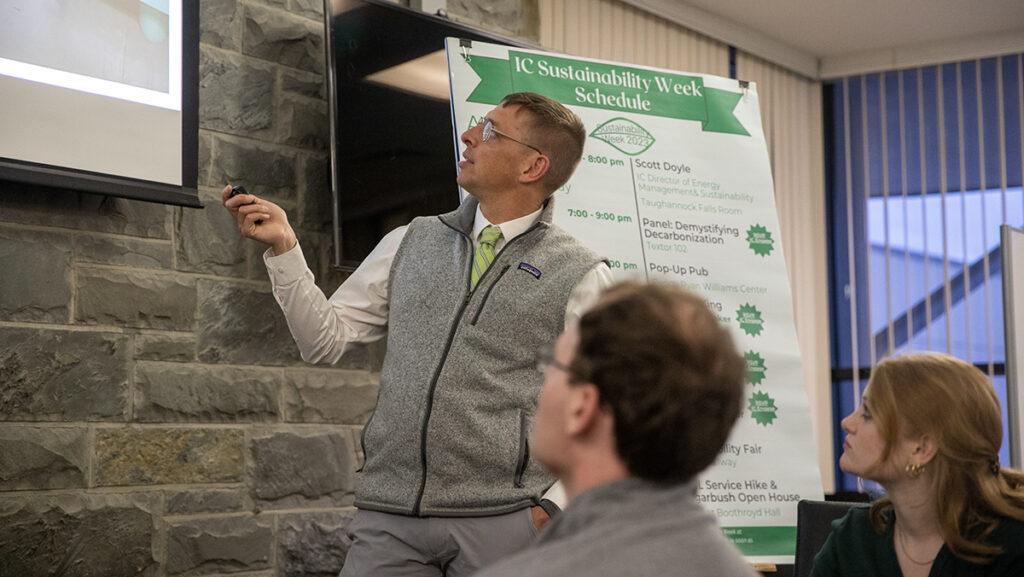Scott Doyle, director of the Office of Energy Management and Sustainability, met with the Student Governance Council on April 17 to discuss the office’s long-term and short-term goals for being more climate-sensible. The council also went over Platform Presentations Night.
Doyle began the meeting by acknowledging the start of Sustainability Week, which ends April 22 and aims to educate students about the college’s efforts to be more environmentally conscious.
In Fall 2022, the college was awarded the gold status for the Association for the Advancement of Sustainability In Higher Education rating and placed in the Top 10 Green Colleges by The Princeton Review. Doyle said that although people were surprised that the college maintained this rating, employees in his office are still making efforts that may not be recognized by the student body.
“People thought we aren’t doing a lot with sustainability –– we are,” Doyle said. “It’s just stuff that isn’t as obvious. … We have things to improve on but operationally, academically, philosophically, there’s a lot of things we are doing we can build off of, but we have a lot we’re doing.”
In 2007, former President Peggy Ryan Williams signed the American College and University Presidents Climate Commitment. This declaration focused on taking decreasing carbon emissions seriously and more intensely measuring emissions. Two years later, the Board of Trustees approved the Climate Action Plan, which would make the college completely climate neutral by 2050.
“We hope and think we could get there before that point, but that’s the ,” Doyle said. “We’re on pace for 2025 for a 50% mark. … We did a lot of the easy things in the early parts, now it gets a little more difficult.”
The office organizes in-use carbon emissions into three scopes: natural gas, electricity and commuting. Gas usage on campus includes powering the heating, and cooling and fueling the fleet of 158 vehicles on campus. Doyle said that, in terms of gas emissions, the college is working toward better car maintenance, improved software, a broader fleet of vehicles and investment in more sustainable fuel. Doyle said acquiring electric vehicles is a high priority over the summer.
“It’s the time to shift them, all our research has shown it, especially from a college institution that doesn’t even drive them very far,” Doyle said.
Doyle said the college gets most of its power from out-of-state green resources, like wind, and is aiming to redirect energy sources to regionally-produced power. Although this may be more expensive, Doyle said investing in these local sources would be cheaper in the long term, in addition to building renewable energy sources, like solar, on campus.
“We buy from totally green sources,” Doyle said. “I think we could get our electricity more locally sourced in about five years.”
Unreliable transportation is a huge factor damaging the third scope, commuting. The college currently partners with the Tompkins Consolidated Area Transit to transport students directly to and from the downtown area. TCAT has reported staffing shortages, while students deal with inconsistent times and report uncomfortable rides. Doyle said the college may need to invest more in the company.
“TCAT has a tough go right now with issues with drivers, riders, technology and other issues,” Doyle said. “I envision that we can potentially work with them to create maybe a more campus commuter type of loop to create an easier way to get around campus.”
Doyle said his office is looking into improving walking and biking accessibility on campus by building walking trails and clarifying bike lanes.
“I refuse to believe this is not a bikeable campus,” Doyle said. “There’s a lot of parts of campus where it’s the easiest way to get around campus without a doubt. … You might see more bikeshare bikes around campus as a trial with that.”
Before concluding the meeting, sophomore Hannah Ahmed, Class of 2025 senator, asked Doyle if the board of trustees at the college gives the department enough funding to do these projects it is planning. Doyle said that although the college does fund the office as a whole, it currently does not have the funding to fully move forward on most projects discussed at the meeting.
“Any project I’m thinking of, I’m factoring in something we’re bringing in from somewhere else,” Doyle said. “One day we may get the right investors, but right now, no.”
The platform presentation night to campaign for the board, held April 18, was the focus of discussions toward the end of the meeting. The April 24 meeting will focus on a bill that would merge the Residential Hall Association with the SGC. This would be a major amendment to the Constitution. Grace Madeya, president of the student body, updated the council on a recent meeting she had with Residential Life who was the guest speaker at the previous SGC meeting.
“We talked about fixing how the survey that recently went out goes to spam posts,” Madeya said. “They also are looking to assist us in any way when it comes to the upcoming election.”







